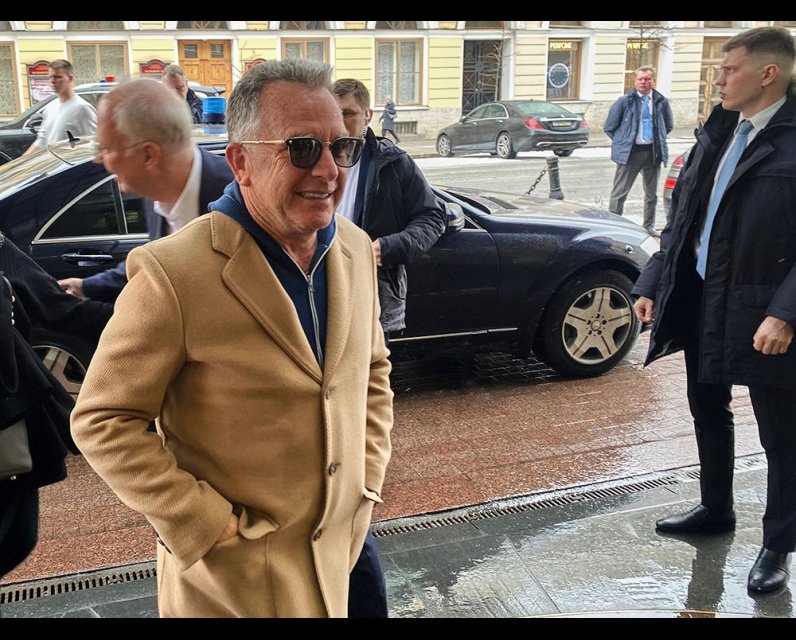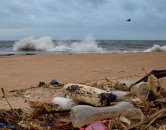Source Feed: National Post
Author: Donna Kennedy-Glans
Publication Date: April 20, 2025 - 09:00
Putin, Trump and the Arctic prize: Why a peace deal in Ukraine could change everything
April 20, 2025

Arctic nations are shoring up their security and sovereignty in the Far North. It’s even a ballot box issue in Canada. But what’s quietly unfolding in the Russian Arctic also warrants our full attention; the stakes are higher than one might expect.
Russia’s Arctic is resource-rich; the remote region has vast reserves of hydrocarbons, immense deposits of rare earth minerals and metals and provides access to the Northern Sea Route along Russia’s northern coast, a far shorter shipping route between Asia and Europe.
In February, Russia’s Foreign Minister, Sergei Lavrov, met with U.S. Secretary of State Marco Rubio and floated the idea of American companies returning to Russia to collaborate in joint projects in the Arctic. A few weeks later, Kirill Dmitriev, head of Russia’s sovereign wealth fund and President Vladimir Putin’s special envoy on economic cooperation, posted on X: “The Arctic is too important for Cold War-style politics. Russia & the U.S. must find common ground to ensure stability, resource development & environmental protection.”
Dr. Tim Reilly, a Russian-speaking, U.K.-based expert in Sino-Russian relations in the Arctic and northeast Asia, and associate with the Scott Polar Research Institute at the University of Cambridge, is gobsmacked by the implications.
“If Putin is serious about offering Big Oil an opportunity back into the Arctic, LNG (liquefied natural gas) or otherwise,” says Tim, “Putin knows full well…he’s sacrificing the Sino-Russian relationship, which he’s built over the last 15 years.”
When I catch up with Tim for a conversation to help me decipher this fast-changing landscape, he’s at Johns Hopkins’ School of Advanced International Studies in the heart of Washington D.C. Alongside other clever folks from NASA, U.S. Space Force, and the intelligence community, he’s participating in a conference to examine “space and the relationship to the Arctic.” Looking very serious in a formal grey suit, Tim chuckles, “there are no jeans here.”
“Isn’t it premature to talk of Western sanctions against Russia being lifted, and Western investors being invited to participate in resource development in the Russian Arctic?” I posit. Everyone can see that ceasefire talks between Ukraine and Russia are stalled; on Palm Sunday, a Russian missile strike on the Ukrainian city of Sumy killed at least 34 people. Half of the U.S. Senate (25 Republicans and 25 Democrats) joined forces to introduce a bill to “sanction the hell” out of Russia if Moscow doesn’t engage in peace talks. U.S. President Donald Trump threatens to impose secondary tariffs on buyers of Russian oil if Moscow keeps blocking efforts to end the war in Ukraine. And on Friday, Rubio told reporters, “If it is not possible to end the war in Ukraine, we need to move on.”
Geo-politics doesn’t move in straight lines, Tim reminds me. In anticipation of a peace deal, the back-channels are flowing. There’s even speculation that the Nord Stream pipelines could be reactivated — allowing Europe to return to importing Russian gas — if Russia and Ukraine reach a peace agreement.
In a March 21 interview with Tucker Carlson, Steve Witkoff, the U.S. special envoy helping Trump navigate Ukraine and Gaza, suggested Russia and America were considering “integrating their energy policies in the Arctic,” sharing sea lanes, collaborating on artificial intelligence and sending liquefied natural gas “into Europe together.”
A week later, at the Arctic Forum in the northern Russian city of Murmansk, Putin’s special envoy, Dmitriev, announced an investment fund for Arctic development to attract partners from the Gulf and the West.
Would Western companies risk returning to Russia? When Russia invaded Ukraine in 2022, ExxonMobil gave up its role in a massive oil project with Rosneft (the Russian state-controlled oil company) on Sakhalin Island. TotalEnergies of France, another Western player, also wrote off billions in Russia but held onto its stake in the Yamal LNG facility that it had helped develop in the Russian Arctic with Novatek, a Russian gas company.
“Big Oil thinks in decades,” Tim quips. Over the years, Tim’s advised ExxonMobil and Shell, super majors with longstanding experience operating in Russia. Western companies’ access to Arctic frontiers of this scale is financially attractive, says Tim; “You’re looking at what’s going to be, or is, the biggest energy market in the world in the 21st century, northeast Asia.
“The big operation in the Arctic is Novatek LNG,” Tim explains. “It’s a high-quality international project, well-financed, well-managed, good technologies,” backed by Russian oligarch Gennady Timchenko, a friend of Putin’s and even “a bit of a golden boy,” Tim adds, with a smile and just a hint of a raised eyebrow.
And, Tim continues, Western investment in Russia’s Arctic resources would undermine China’s influence in that region.
Chinese players own a significant stake in the Novatek LNG joint venture; the project affords them the opportunity to build ice-breaker tankers and invest in the “Polar Silk Road” (under China’s Belt and Road Initiative) to leverage Arctic navigable sea routes. That work, Tim explains, “includes digitalizing the Northern Sea Route, within the sort of undersea defence and strategic intelligence game that’s absolutely exploding.”
“You’re destroying the Sino-Russian relationship,” with Western investment in Russia’s Arctic, Tim concludes, “which de facto means you have completely strangled at birth further cooperation with China and Russia in space.” Because the real prize, according to Tim, is not just economic opportunity, it’s access to space over the North Pole and the Northern Hemisphere.
“There is an assumption that governance in the 21st century over the Arctic is terrestrial-based — NATO, the Arctic Council and those sorts of organizations,” he says.
Tim sees the world differently, in three dimensions: “If one can position oneself in space above the Arctic, one can influence two oceans and three continents — the entire Northern Hemisphere.” That’s in part, he suggests, why the United States, some years ago identified the Indo-Pacific, the continent of Eurasia, and the Arctic as the three most important regions in the 21st century; all three are in the Northern Hemisphere.
It also explains, Tim adds, why the Chinese are suggesting that the two poles, Antarctica and the Arctic, be included in what’s known as the “global commons” (alongside the deep seabed, deep space, cyber-space) belonging to all mankind.
Tim, and like-minded experts, spend a lot of time connecting the dots between the Arctic and access to space. Head-spinning stuff, but it’s his opinion that “a new world order will be decided in space,” and the structure of it “will then be reflected on our life on Earth.”
Western investment — Arctic LNG — access to space over the Northern Hemisphere: it could be a three-legged stool for prosperity in the Russian Arctic. Or it could be a ruse to promote Russia as a collaborative actor. “Putin is hedging,” Tim agrees, “he always does.”
National Post
Our website is the place for the latest breaking news, exclusive scoops, longreads and provocative commentary. Please bookmark nationalpost.com and sign up for our daily newsletter, Posted, here.
Last fall, Ontario announced financially focused audits of 37 children's aid organizations in the province after a push from Premier Doug Ford.
April 22, 2025 - 06:00 | Isaac Callan | Global News - Ottawa
A local environmental charity from Georgian Bay is the first in North America to partner with an app that gamifies helping the environment.
April 22, 2025 - 05:00 | Sawyer Bogdan | Global News - Canada
A local environmental charity from Georgian Bay is the first in North America to partner with an app that gamifies helping the environment.
April 22, 2025 - 05:00 | Sawyer Bogdan | Global News - Ottawa



Comments
Be the first to comment